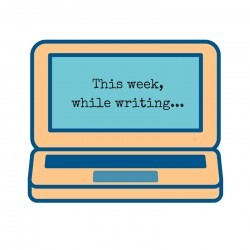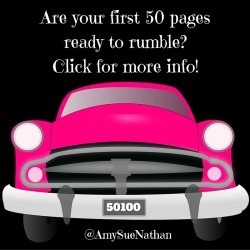The Writing Life #2
 This week, while writing, I remembered that I actually do have to WRITE to figure out a story. Outlining is all well and fine, but for me to even know what my story is, I have to start writing the first scene. That only happens when the first scene has presented itself to me, usually when I’m in the shower.
This week, while writing, I remembered that I actually do have to WRITE to figure out a story. Outlining is all well and fine, but for me to even know what my story is, I have to start writing the first scene. That only happens when the first scene has presented itself to me, usually when I’m in the shower.
Writing it AS IF it were the actual book, well, that’s how the whole thing comes together, the bits and the characters that won’t show up for ten, twenty, a hundred pages, all reveal themselves to me as I compose and construct my novel’s opening scene.
That’s why this is one of my favorite quotes about writing. Not only is Kurt Vonnegut one of my all-time favorite authors, his creative writing advice is spot on.
Give your readers as much information as possible as soon as possible. To heck with suspense. Readers should have such complete understanding of what is going on, where and why, that they could finish the story themselves, should cockroaches eat the last few pages.
If you’re scratching your head (or squirming due to the cockroach image) stop for a minute. To me, this doesn’t mean give away the twists and turns and surprises. To me, this means, setting your readers’ expectations. Allowing her to know who and what this story will be about. Wait (that’s what you’re thinking, isn’t it?) aren’t we supposed to surprise the reader? Yes, sure, but…how many times have we all heard, or known someone who has an agent, editor, or critique partner say:
I don’t know what the story is about.
How many times have you not even known what your story is about?
That’s what Vonnegut’s advice does for me. It absolves me of the pressure of keeping the novel a secret. It says let the reader be able to imagine what the story is about. Will she be right? Probably not. Imaginations have unique qualities, even if our ideas overlap. But that will add to the fun, for you and for your reader. As writers we think that cloaking the story will make the reader turn the page, when in fact, revealing the story is what will do that again and again through three hundred pages.
I often share with my editing clients that setting up the reader’s expectation as soon as possible is what’s most important. You can have a beautiful writing but most of the time (like 99%) that’s not enough. You have to have a great story, or at the very least, the promise of a great story, to hook the reader. Hints at who your main character is, what she wants, where she’s going, and how she’s going to get there should be present almost right away—even if it changes as the story progresses!
In most reading experiences, readers today do not turn too many pages because of beautiful writing alone. They turn the pages because the story compels them to do so. From page one.
That’s why it has taken me a week to write the first draft of a 1200 word first scene for my next novel. And by first draft I mean, I have rewritten it six times (that’s a low estimate). I am writing and rewriting and tweaking and polishing, knowing that it will likely change, and that it might not end up even being where the story starts. But writing it, I learn more and more about what’s to come later, and judiciously add bits that allude to the past and to the future of my characters and their stories.
Starting a new novel is literally starting all over again. I take with me what I’ve learned but am applying it to something new, which means, some of it works and some of it doesn’t, and some of it works in ways I didn’t think it could, or would.
It’s encouraging to me that little by little this new story is revealing itself to me. My plan is to write three to four chapters at which time I should (oh, I better) know more of the details of the rest of the story and can roughly outline it. Right now I have the main points set, but as we all know,
Authors plan, characters laugh.
For The Glass Wives I wrote a chapter and outlined the next. For The Good Neighbor I had a twenty-page synopsis that loosely guided my writing. For Left To Chance I used index cards, then decided I didn’t need them, then realized I wrong, then used index cards again. For this next book, I’m going to combine the methods I used for each book.
Next Sunday I will share my one-hundred times revised first scene of either Left To Chance or my WIP, and we can decide together if I’ve set up enough expectations for my readers. After that, I’ll ask for guinea pigs volunteers!
How was your week in writing? How do you feel about Vonnegut’s advice? Let me know in the comments!
Amy xo
Women's Fiction Writers
- Amy Sue Nathan's profile
- 543 followers




